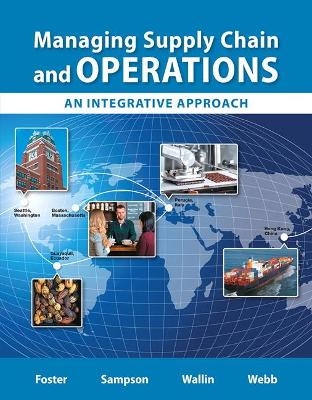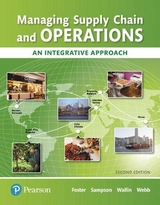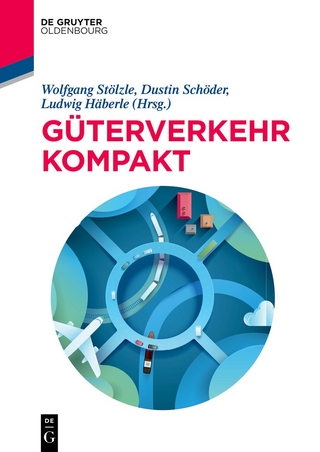
Managing Supply Chain and Operations
Pearson (Verlag)
978-0-13-283240-3 (ISBN)
- Titel erscheint in neuer Auflage
- Artikel merken
For undergraduate and graduate operations management courses.
Smart managers understand that firms do not act alone to produce products and services. The new Managing Supply Chain and Operations shows students how and why supply chain and operations management is important to their future careers.
This text takes a balanced approach and, while rigorous, is not solely focused on quantitative material. The authors employ a four-part integrative model throughout the text that ties together the key functions of supply chain, operations, and customer relationship management that focuses on improving, innovating, and integrating in these areas. With cutting-edge material and an up-to-date global approach, this text is filled with scenarios and real-world examples that will prepare today’s students to be tomorrow’ssuccessful managers.
Fully integrated with MyOMLab, students and instructors alike will benefit from personalized learning and a dynamic set of assessment tools that will help improve performance in the course.
Also available with MyOMLab MyOMLab is an online homework, tutorial, and assessment program designed to work with this text to engage students and improve results. Within its structured environment, students practice what they learn, test their understanding, and pursue a personalized study plan that helps them better absorb course material and understand difficult concepts.
S. Thomas Foster is the Donald Staheli Professor and department chair of global supply chain management at Brigham Young University’s Marriott School of Management. He is an internationally recognized expert in quality and global supply chain management and has experience in manufacturing, financial services, and international oil exploration. He has consulted for more than 30 organizations, including Hewlett-Packard, Heinz Frozen Foods, Hyundai Corporation, and the U.S. Department of Energy. Foster is on the editorial boards of the Journal of Operation Management, Decision Sciences, and Quality Management Journal. He has published more than 80 articles in journals such as Decision Sciences, Journal of Operations Management, International Journal of Production Research, and Quality Management Journal. His book Quality Management: Integrating the Supply Chain is an international best seller. Scott Sampson is the Hazel S. Thorsell Professor of global supply chain management with the Marriott School of Management at Brigham Young University. He teaches MBA, executive MBA, and undergraduate courses in services management and supply chain management. Sampson is the author of the textbook Understanding Service Businesses, which is used at universities around the world. His award-winning research involves service design paradigms, service quality measurement, and service supply chains. He has published research in leading academic journals, including Management Science, Production and Operations Management, Operations Research, Decision Sciences, and Journal of Operations Management. He received his MBA and PhD degrees from the University of Virginia and taught at Florida State University prior to joining the Brigham Young University faculty. Cindy Wallin is a professor of global supply chain management at Brigham Young University’s Marriott School of Management. She earned her PhD in supply chain management from the W. P. Carey School of Business at Arizona State University. Wallin’s research focuses on buyer-supplier interfaces in the form of trust-based relationships, information sharing, collaboration, and collaborative inventory management approaches. Her research has been published in various journals, including Decision Sciences Journal, Journal of Supply Chain Management, Quality Management Journal, and Journal of Business Logistics. Before pursuing her doctoral studies, Wallin was a commodity team manager for Intel Corporation. During her eight years at Intel, she also held the positions of senior buyer, purchasing manager, stores manager, and commodity manager. Before her graduate studies, Wallin also worked as an auditor for the Defense Contract Audit Agency. Scott Webb is a professor of global supply chain management at Brigham Young University and specializes in logistics management. He received his PhD in logistics and operations management from the Eli Broad College of Business at Michigan State University. In addition to his PhD, he earned an MS degree in logistics management from the Air Force Institute of Technology and a BA in experimental psychology from the College of Idaho. During his Air Force Career, Webb worked on both base- and Pentagon-level assignments. He separated from active duty military service in 2008 at the rank of major and after earning both AF Commendation Medals and the AF Meritorious Service Medal.
Part 1: Integrating Supply Chain and Operations Management
Chapter 1: Introduction to Supply Chain and Operations Management
1) Why Are You Studying Supply Chain and Operations Management?
2) Supply Chain and Operations Management
3) An Integrative Model for SC&O Management
4) The Four I’s
Chapter 2: Supply Chain and Operations Strategy
1) Generic SC&O Strategies and Alignment
2) SC&O Strategy Process and Content
3) Competitive Landscape and Porter’s five forces
4) Supply Chain Strategy
5) Strategy Execution
6) Strategic Metrics and Measurements
7) The Changing Strategic Environment: Globalization, Sustainability, and Innovation
Part 2: Innovating Supply Chain and Operations
Chapter 3: Product and Process Design and Mapping
1) Process Design
2) Process Mapping
3) Product Design
4) Quality Function Deployment
5) Green Design
Chapter 4: Service Design
1) Services and Tangibles
2) The Key Elements of Service Design
3) Process Chain Network Tool for Service Design
4) Planning Service Capacity for Uncertain Demand
5) Queuing Theory
Chapter 5: Customer Relationship Management
1) Customer Relationships and Systems
2) Improving Customer Service
3) Change Relationships through Servitization
4) Manage Service Supply Chains
Part 3: Impacting Supply Chain and Operations Performance
Chapter 6: Strategic Sourcing
1) Origins Of The Purchasing Profession
2) Effect Of Strategic Sourcing On The Firm
3) Portfolio Approach To Strategic Sourcing
4) Strategic Cost Management
Chapter 7: Supply Management
1) The Supplier Management Processes
2) Identifying Needs
3) Supplier Selection
4) Supplier Development
5) Providing Feedback: The Supplier Scorecard
Chapter 8: Demand Management and Forecasting
1) The Art of Demand Management
2) Time Series Forecasting
3) Naive Forecasting Methods
4) Time Series Forecasting Using Regression
Chapter 9: Inventory Management Fundamentals and Independent Demand
1) Inventory
2) Inventory Management
3) Demand Analysis
4) Inventory Models
Chapter 10: Sales and Operations Planning and Enterprise Resource Planning
1) Sales And Operations Planning
2) Capacity
3) Capacity Planning
4) Enterprise Resource Planning
5) Material Requirements Management
Chapter 11: Logistics
1) The Strategic Importance of Logistics
2) Fundamental Logistics Trade-Offs
3) The Five Logistics Processes
Part 4: Improving Supply Chain and Operations Management Performance
Chapter 12: Project Management
1) Project Management
2) Project Planning Tools
3) PERT/CPM
4) Gantt Charts with Precedence
Chapter 13: Supply Chain Quality Management
1) Dimensions of Product and Service Quality
2) Well-Known Quality Experts
3) What is Supply Chain Quality Management?
4) Quality in Services
5) Quality Tools And Approaches
Chapter 14: Statistical Process Control
1) Statistical Thinking And Variation
2) Process Stability
3) Variables And Attributes Process Control Charts
4) Applying Control Charts
5) Process Capability
Chapter 15: Lean and Six Sigma Management and Leading Change
1) What is Six Sigma?
2) Principles of Lean
3) Lean Practices
4) Change Management
| Erscheint lt. Verlag | 2.2.2015 |
|---|---|
| Sprache | englisch |
| Maße | 221 x 284 mm |
| Gewicht | 1260 g |
| Themenwelt | Technik ► Maschinenbau |
| Wirtschaft ► Betriebswirtschaft / Management ► Logistik / Produktion | |
| ISBN-10 | 0-13-283240-2 / 0132832402 |
| ISBN-13 | 978-0-13-283240-3 / 9780132832403 |
| Zustand | Neuware |
| Haben Sie eine Frage zum Produkt? |
aus dem Bereich



